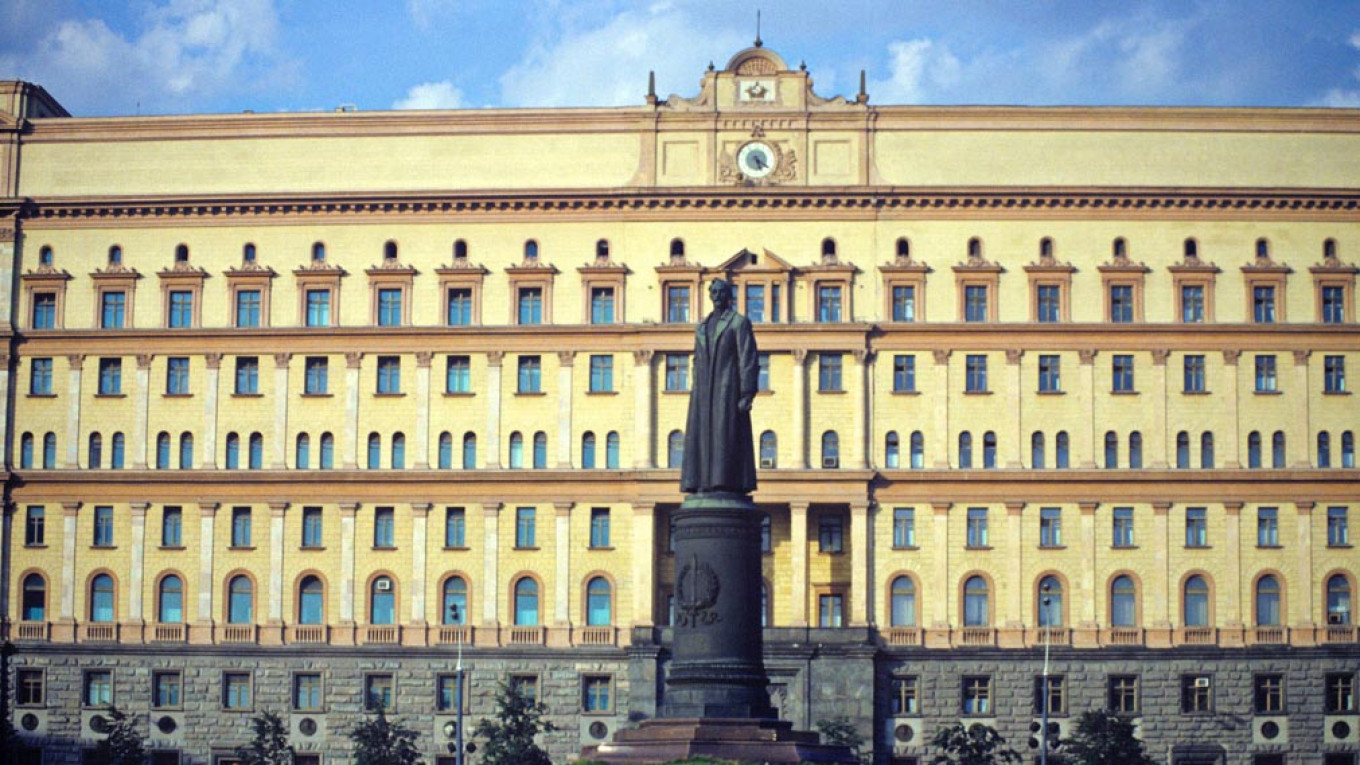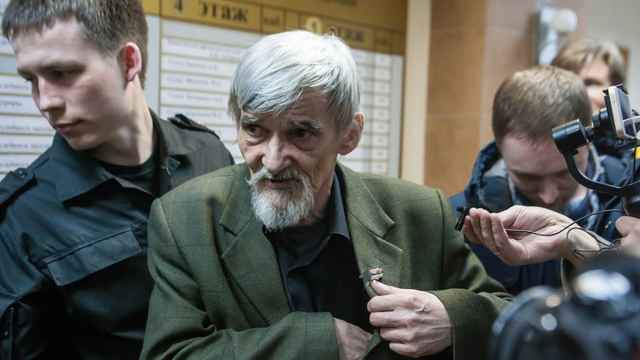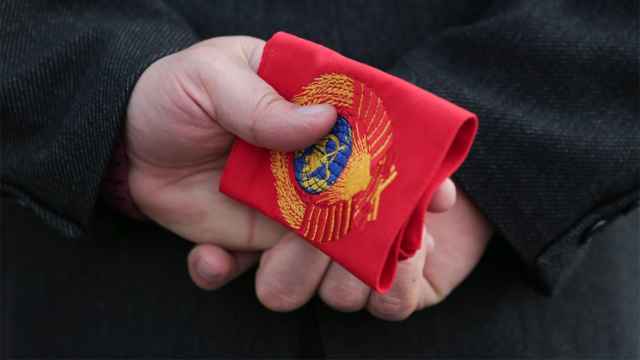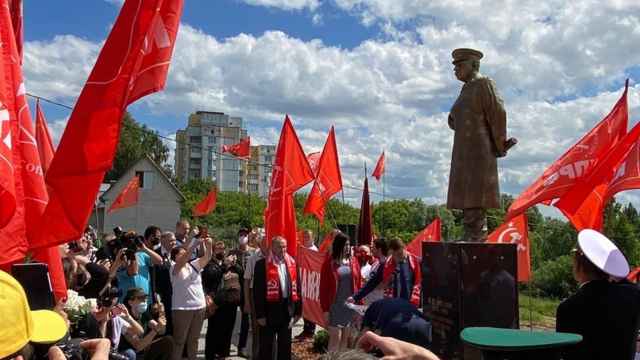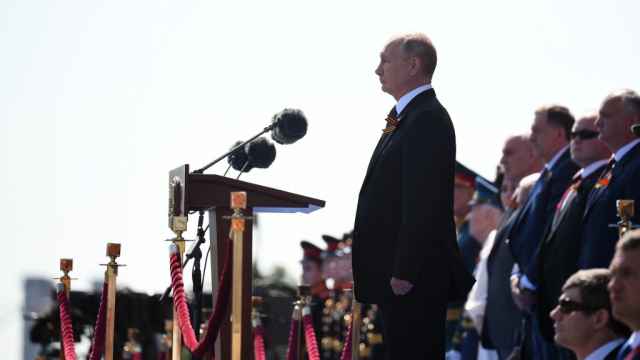On the night of Aug. 23 1991, as a coup attempt by communist hardliners bent on preserving the dissolving Soviet Union collapsed, Sergei Stankevich rushed to the KGB headquarters on Moscow’s Lubyanka Square.
With victorious anti-coup Muscovites preparing to pull down the statue of Soviet secret police founder Felix Dzherzinsky outside the building, Stankevich — then a lawmaker in the Moscow City Soviet — had been appointed by his colleagues to ensure that the eleven ton statue was toppled without damaging the Metro station below.
“I told people that we shouldn’t leave ourselves open to accusations of lawlessness or vandalism,” Stankevich told The Moscow Times. “It was history and it had to be done strictly according to the law.”
Almost thirty years after the statue fell — for many symbolising the end of the U.S.S.R. — Russian opinion is deeply split on remembrance of the country’s Soviet past and a government-backed vote on whether to restore “Iron Felix” to his former place has become a flashpoint in Russia’s controversial memory politics.
When, on Feb. 19, Moscow’s Civic Chamber government advisory body announced a week-long online vote of Muscovites on whether Lubyanka Square — which has lain empty since 1991 bar a small monument to Gulag victims — should host the restored Dzerzhinsky or a new statue to 13th century Russian prince Alexander Nevsky, public reaction was immediate and intense.
Zakhar Prilepin, a nationalist writer and politician who lobbied for the initial proposal to restore the secret policeman’s statue, wrote on Facebook that Dzerzhinsky’s return would be “a symbolic act of colossal significance,” showing that Russia is “ready to overcome the chaos and decay of 1991.”
Stankevich — who in the years after 1991 forged a career in liberal politics — is categorically opposed to the return of the statue whose demolition he supervised.
“In fact, it is depressing that we are even discussing this topic,” he said.
The restoration of Dzerzhinsky — a Polish-born Bolshevik revolutionary who founded the Cheka secret police and played a major role in the post-revolution Red Terror before dying in 1926 — had been regularly proposed by leftist and nationalist politicians, including the Communist Party and former Moscow mayor Yury Luzhkov.
However, the Kremlin itself had traditionally avoided the fraught question of the fallen monument, preferring to avoid a divisive row by leaving it in Muzeon, a central Moscow park that hosts a range of toppled Soviet-era statues, and where Dzerzhinsky has stood since 1991.
“It’s a strange time to raise this issue,” said Andrei Kolesnikov, head of the Russian domestic politics and political institutions program at the Carnegie Moscow Center.
“Russian society is already divided. And the Dzerzhinsky discussion is aggravating the divide.”
It is an approach that chimed with the Kremlin’s wider relationship with the Soviet past. Throughout his two decades in office, President Vladimir Putin has presided over a limited reevaluation of the Soviet past, with new monuments erected and Josef Stalin’s record of war leadership and rapid industrialization stressed.
At the same time, he has steered clear of the full-scale rehabilitation that might alienate liberals, anti-communists and the influential Orthodox Church, which suffered under Bolshevik repression and has publicly opposed the statue’s return.
Mixed feelings
The controversy over Dzerzhinsky’s Moscow statue stands in stark contrast to public perception of the Cheka’s founding leader.
Though Russians’ feelings towards the Soviet past have warmed in recent years, with a record 70% of respondents assessing Stalin positively in a 2019 poll, opinions on Dzerzhinsky have been more mixed.
In 2013, data from the state-funded pollster VTsIOM found that 46% of Russians see Dzerzhinsky positively, results echoed in a 2015 poll by the independent Levada Center, which showed respondents evenly split on the question of his statue’s return to Lubyanka Square.
Likewise, Dzerzhinsky — though his name is borne throughout Russia by dozens of monuments, around 1300 streets and a city of 240,000 — is a far less prominent figure than Lenin or Stalin, being almost exclusively identified with founding the Cheka and repressing the anti-Bolshevik opposition in the early 1920s.
“As a historical personality Dzerzhinsky is a relatively niche figure,” said Olga Malinova, a professor at Moscow’s Higher School of Economics who researches historical memory.
“But he does have some appeal to those who prioritise a strong state and national security.”
Above all, however, Dzerzhinsky is admired by Russia’s powerful security apparatus, especially the FSB - the KGB’s successor organization which operates out of the same Lubyanka Square headquarters and is directly descended from Dzerzhinsky’s original Bolshevik Cheka.
Russia’s secret services see Dzerzhinsky as their founding father, and took his toppling from Lubyanka Square personally.
“The footage of the statue being toppled in 1991 was symbolic of a revolution against the Soviet state,” said Kolesnikov.
“In restoring the statue, they are nullifying that revolution.”
Competitor Nevsky
For some observers, the choice of Alexander Nevsky as a competitor to Dzerzhinsky is as significant as the secret police chief’s potential return.
Nevsky, a 13th century prince of the historic city of Novgorod, then a major trading port located between Moscow and present-day Saint Petersburg, is chiefly known for defeating an invasion of German Teutonic Knights in 1242.
Nevsky’s victory saw him made a saint by the Orthodox Church and later glorified as a hero of anti-Western Russian patriotic resistance in the Stalin era, most prominently in Sergei Eisenstein’s 1938 historical epic film.
For the Carnegie Center’s Kolesnikov, presenting Muscovites with the choice of Nevsky or Dzerzhinsky represents the consolidation of Putin’s conservative, nationalist brand of politics.
“Both Nevsky and Dzerzhinsky are perceived as essentially patriotic, anti-Western figures that chime well with the Kremlin’s present ideology. Dzerzhinsky symbolizes the return of the secret police’s power, and Nevsky victory over Western invaders.” said Kolesnikov.
According to Kolesnikov, with the constitutional amendments of July 2020 enshrining many conservative priorities — from giving special status to ethnic Russians to placing national law over international law — into Russia’s constitution, installing a statue to an ideologically suitable figure on one of Moscow’s largest public squares would mark the public triumph of Putin’s conservatism.
“Placing either in such a prominent position would symbolize the dominance of the new conservative order in Russia,” said Kolesnikov.
Not Stalinists
With the BBC’s Russian Service reporting that the Presidential Administration — the Kremlin department that manages domestic politics — would prefer Nevsky to beat Dzerzhinsky in the online vote, some observers suspect their true aim is to close the issue of the Cheka founder’s return for good, while enshrining the 13th century prince on Lubyanka.
“Putin and his inner circle are not Stalinists,” said Malinova.
“They may admire aspects of Dzerzhinsky’s legacy, but they do not excuse the Terror or the purges. I suspect they would rather forget him than commemorate him in such a prominent spot.”
Even so, for those who imagined that Dzerzhinsky’s removal from Lubyanka represented a decisive break with Russia’s authoritarian past, even the possibility of his return is a bitter pill to swallow.
“Restoring Dzerzhinsky is a declaration that the age of the Terror has returned,” said Stankevich.
“Returning the statue to Lubyanka would represent nothing less than the restoration of the Bolshevik regime.”
A Message from The Moscow Times:
Dear readers,
We are facing unprecedented challenges. Russia's Prosecutor General's Office has designated The Moscow Times as an "undesirable" organization, criminalizing our work and putting our staff at risk of prosecution. This follows our earlier unjust labeling as a "foreign agent."
These actions are direct attempts to silence independent journalism in Russia. The authorities claim our work "discredits the decisions of the Russian leadership." We see things differently: we strive to provide accurate, unbiased reporting on Russia.
We, the journalists of The Moscow Times, refuse to be silenced. But to continue our work, we need your help.
Your support, no matter how small, makes a world of difference. If you can, please support us monthly starting from just $2. It's quick to set up, and every contribution makes a significant impact.
By supporting The Moscow Times, you're defending open, independent journalism in the face of repression. Thank you for standing with us.
Remind me later.



